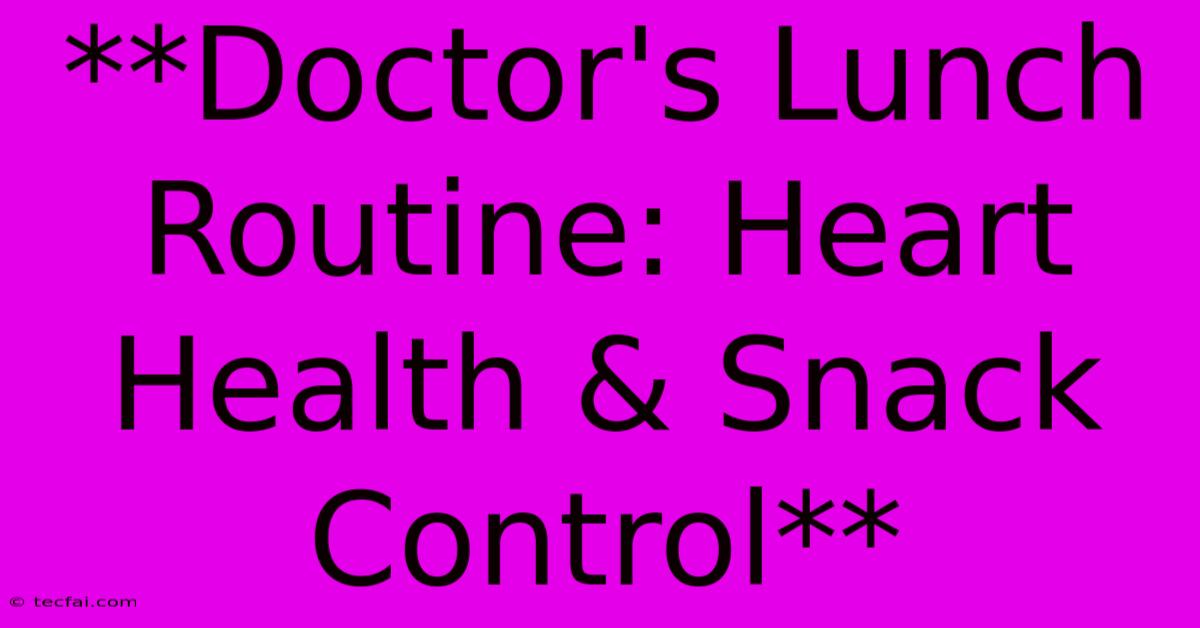**Doctor's Lunch Routine: Heart Health & Snack Control**

Discover more detailed and exciting information on our website. Click the link below to start your adventure: Visit Best Website tecfai.com. Don't miss out!
Table of Contents
Doctor's Lunch Routine: Heart Health & Snack Control
As a doctor, you know the importance of a healthy lifestyle, especially when it comes to heart health. But with busy schedules and long hours, it can be challenging to prioritize your own well-being, particularly when it comes to lunch.
This article will delve into the importance of a balanced lunch routine for doctors, focusing on heart health and effective snack control to maintain optimal energy levels throughout the day.
The Importance of a Healthy Lunch for Doctors
Doctors face demanding workdays filled with patient consultations, paperwork, and emergency situations. Maintaining energy levels and focus is crucial for optimal patient care and decision-making. A healthy lunch plays a vital role in achieving this.
Here are some key reasons why a nutritious lunch is essential for doctors:
- Improved Cognitive Function: A balanced meal rich in nutrients provides the brain with essential energy sources like glucose, vital for optimal cognitive function, concentration, and problem-solving.
- Enhanced Mood and Energy: Eating a healthy lunch helps stabilize blood sugar levels, preventing energy crashes and mood swings that can negatively impact work performance.
- Reduced Stress Levels: Skipping meals or consuming unhealthy foods can increase stress hormone levels. A nourishing lunch can help regulate cortisol levels, promoting a sense of calm and well-being.
- Heart Health Protection: A balanced diet is key to maintaining heart health. Choosing heart-healthy foods at lunch can reduce the risk of cardiovascular disease, a leading cause of death in the United States.
Heart-Healthy Lunch Options for Doctors
Doctors are familiar with the importance of a heart-healthy diet. Here are some practical lunch ideas that can be easily prepared or chosen from a restaurant menu:
- Grilled Salmon with Roasted Vegetables: Salmon is rich in omega-3 fatty acids, which have been shown to reduce inflammation and improve heart health.
- Lentil Soup with Whole Wheat Bread: Lentils are a great source of fiber, protein, and folate, which are important for heart health.
- Chicken Salad on Whole Wheat Bread: Chicken salad is a light and protein-rich lunch option, especially when made with whole-wheat bread for added fiber.
- Tuna Salad Sandwich with Spinach and Tomato: Tuna is a good source of lean protein and omega-3 fatty acids, making it a heart-healthy choice.
- Greek Yogurt with Berries and Nuts: Greek yogurt is a high-protein option, while berries and nuts offer antioxidants and healthy fats.
Snack Control for Sustained Energy Levels
While lunch is crucial, it's important to manage snacking habits to prevent unnecessary calorie intake and sugar crashes. Here are some strategies for snack control:
- Plan Ahead: Prepare healthy snacks in advance to avoid reaching for unhealthy options when hunger strikes.
- Choose Nutrient-Dense Options: Opt for snacks that are high in protein, fiber, and healthy fats, like nuts, seeds, fruits, or Greek yogurt.
- Stay Hydrated: Drinking plenty of water throughout the day can help curb hunger and prevent dehydration.
- Listen to Your Body: Pay attention to your hunger cues and eat when you truly need to.
- Mindful Eating: Engage in mindful eating practices by focusing on the taste and texture of your food, which can help you eat less and feel more satisfied.
Conclusion
Doctors are entrusted with the well-being of others, and it's crucial to prioritize their own health and well-being. A balanced lunch routine incorporating heart-healthy options and mindful snack control is essential for maintaining optimal energy levels, cognitive function, and overall health. By implementing these strategies, doctors can achieve a healthy work-life balance, ensuring they can continue to provide excellent patient care.

Thank you for visiting our website wich cover about **Doctor's Lunch Routine: Heart Health & Snack Control**. We hope the information provided has been useful to you. Feel free to contact us if you have any questions or need further assistance. See you next time and dont miss to bookmark.
Featured Posts
-
One Condition For Line Of Dutys Return
Nov 13, 2024
-
Ahmed Hassan On Wissam Abu Alis Al Ahly Status
Nov 13, 2024
-
Actors Surprise Wedding Confirms Relationship Status
Nov 13, 2024
-
Jake Paul Vs Mike Tyson A Look At The Upcoming Match
Nov 13, 2024
-
Northeast Experiences Verizon Fios Internet Outage
Nov 13, 2024
